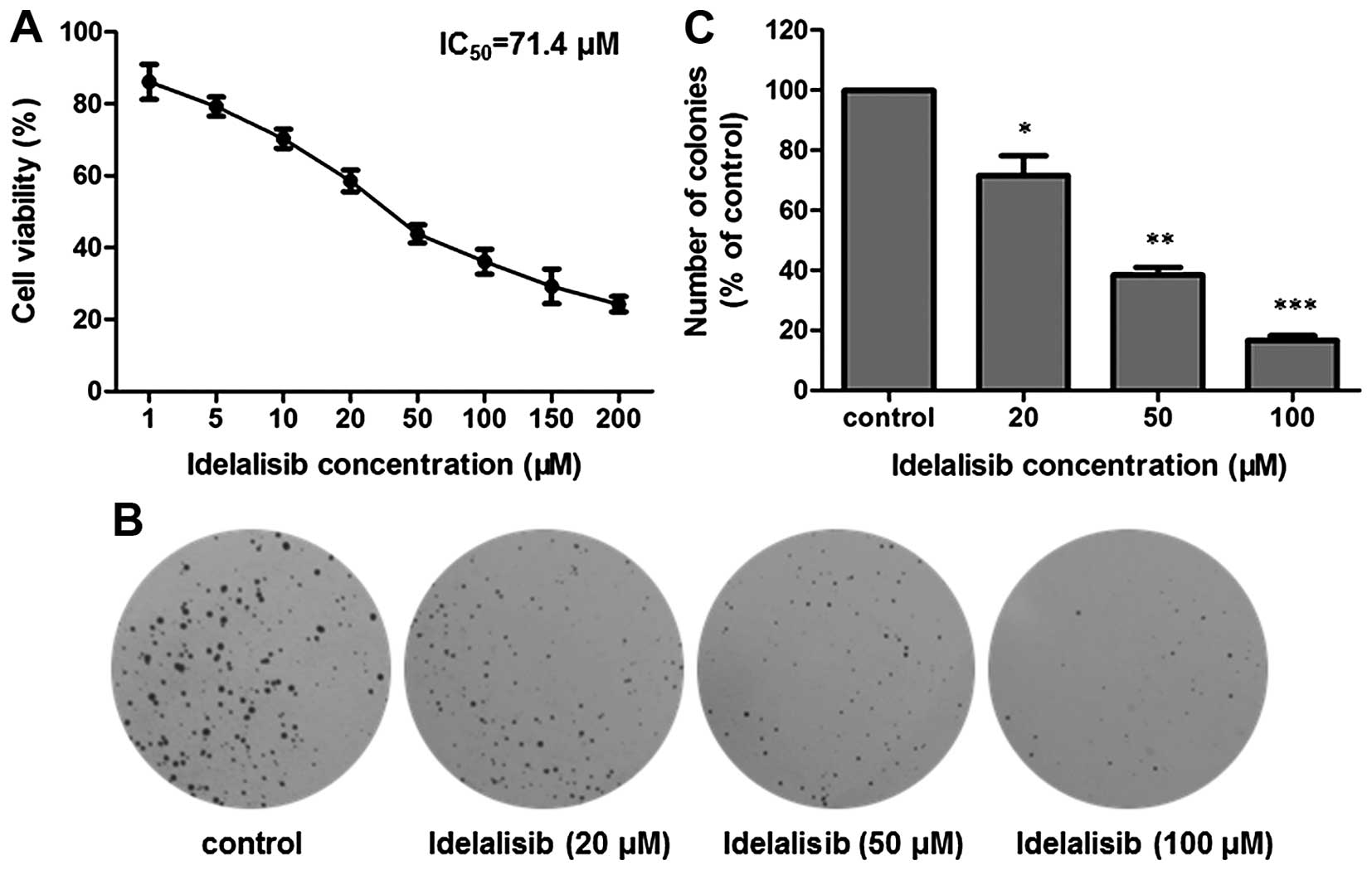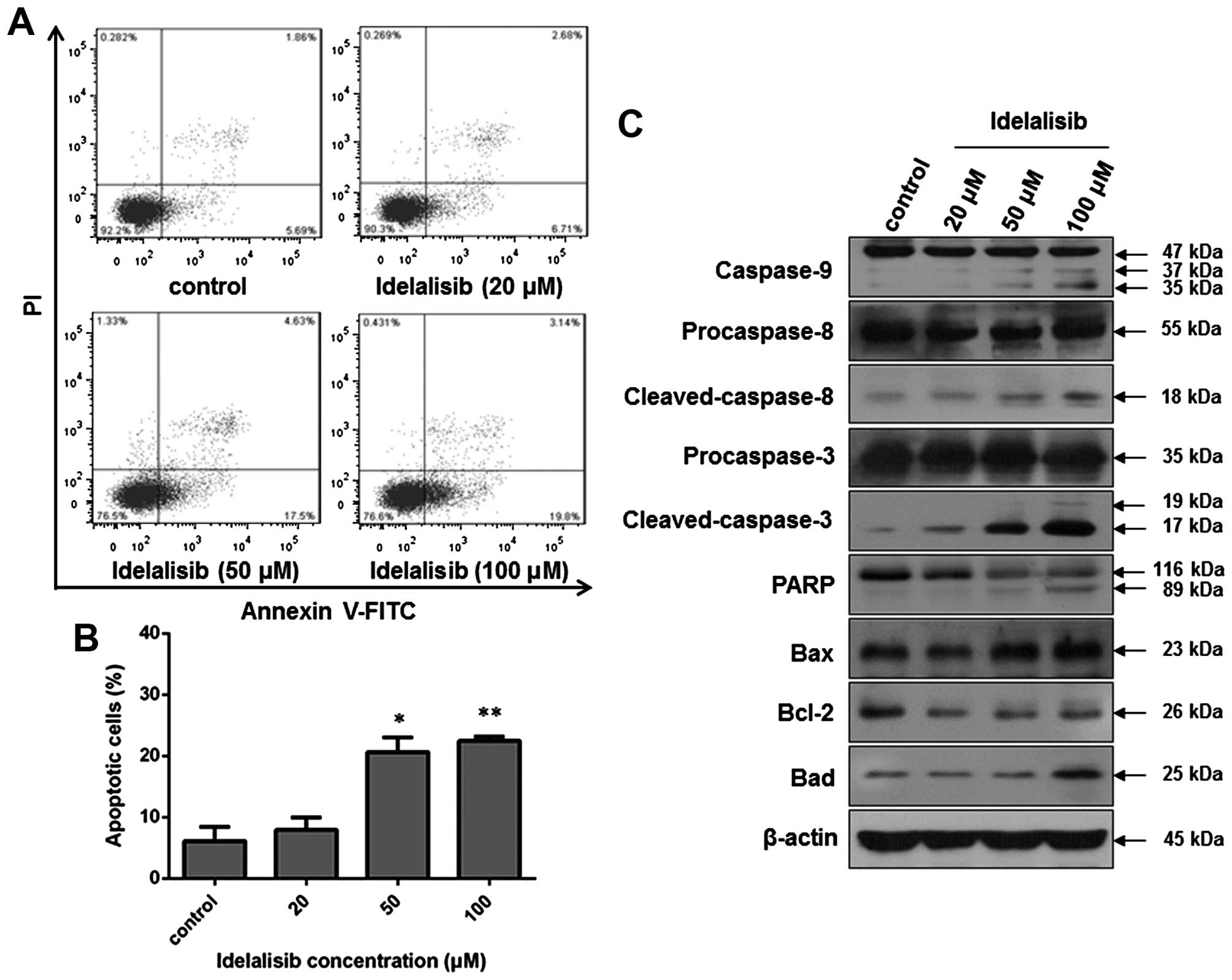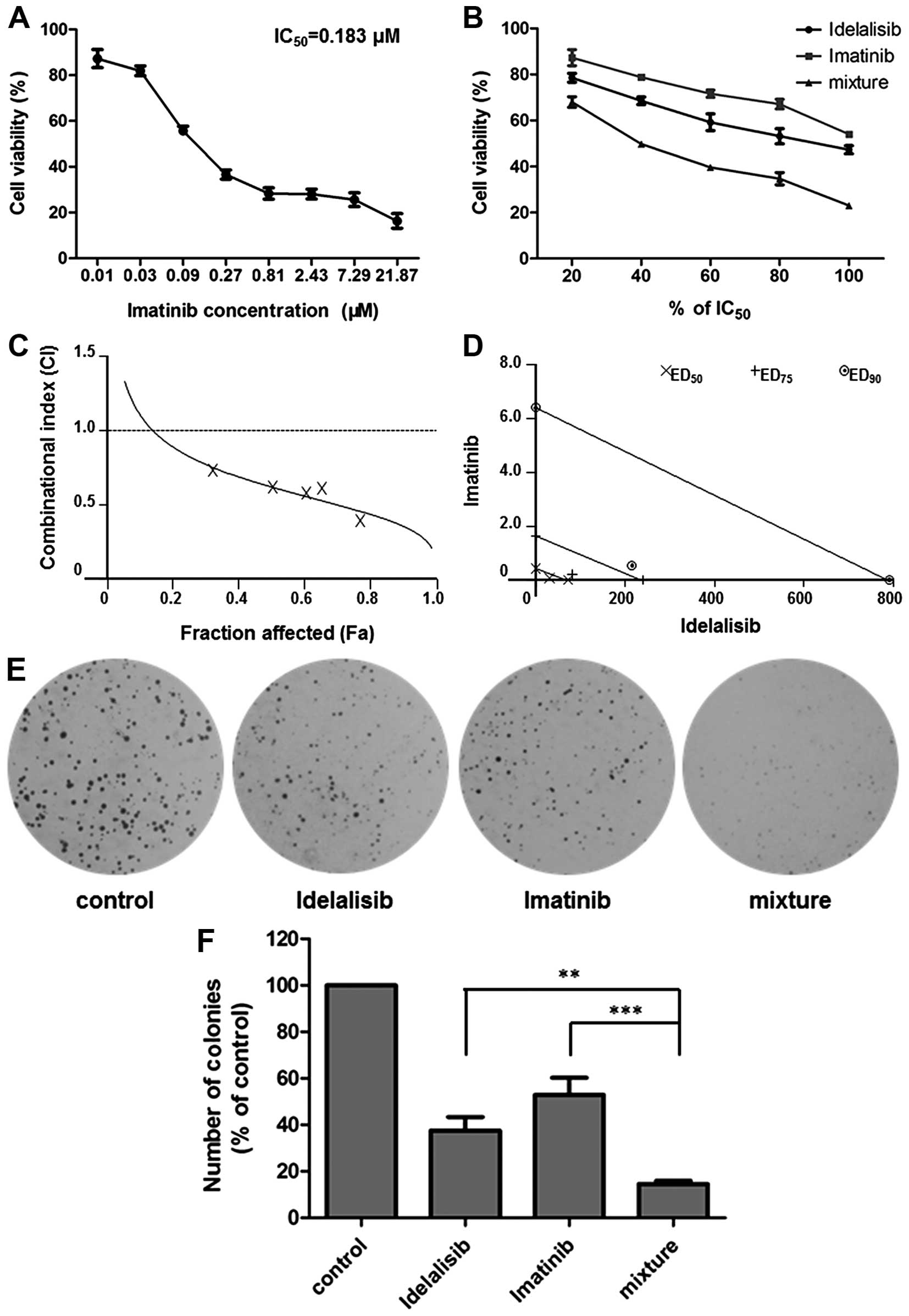|
1
|
Maru Y: Molecular biology of chronic
myeloid leukemia. Cancer Sci. 103:1601–1610. 2012. View Article : Google Scholar : PubMed/NCBI
|
|
2
|
Holyoake TL and Helgason GV: Do we need
more drugs for chronic myeloid leukemia? Immunol Rev. 263:106–123.
2015. View Article : Google Scholar : PubMed/NCBI
|
|
3
|
Rangatia J and Bonnet D: Transient or
long-term silencing of BCR-ABL alone induces cell cycle and
proliferation arrest, apoptosis and differentiation. Leukemia.
20:68–76. 2006. View Article : Google Scholar : PubMed/NCBI
|
|
4
|
Chereda B and Melo JV: Natural course and
biology of CML. Ann Hematol. 94:(Suppl 2). S107–S121. 2015.
View Article : Google Scholar : PubMed/NCBI
|
|
5
|
Larson RA: Is there a best TKI for chronic
phase CML? Blood. 126:2370–2375. 2015. View Article : Google Scholar : PubMed/NCBI
|
|
6
|
Liu N, Zang S, Liu Y, Wang Y, Li W, Liu Q,
Ji M, Ma D and Ji C: FZD7 regulates BMSC-mediated protection of CML
cells. Oncotarget. 7:6175–6187. 2016.PubMed/NCBI
|
|
7
|
Brown JR: Idelalisib has CLL on the run!
Blood. 126:2656–2657. 2015. View Article : Google Scholar : PubMed/NCBI
|
|
8
|
Brown JR, Byrd JC, Coutre SE, Benson DM,
Flinn IW, Wagner-Johnston ND, Spurgeon SE, Kahl BS, Bello C, Webb
HK, et al: Idelalisib, an inhibitor of phosphatidylinositol
3-kinase p110δ, for relapsed/refractory chronic lymphocytic
leukemia. Blood. 123:3390–3397. 2014. View Article : Google Scholar : PubMed/NCBI
|
|
9
|
Morabito F, Gentile M, Seymour JF and
Polliack A: Ibrutinib, idelalisib and obinutuzumab for the
treatment of patients with chronic lymphocytic leukemia: Three new
arrows aiming at the target. Leuk Lymphoma. 56:3250–3256. 2015.
View Article : Google Scholar : PubMed/NCBI
|
|
10
|
Kharas MG, Janes MR, Scarfone VM, Lilly
MB, Knight ZA, Shokat KM and Fruman DA: Ablation of PI3K blocks
BCR-ABL leukemogenesis in mice, and a dual PI3K/mTOR inhibitor
prevents expansion of human BCR-ABL+ leukemia cells. J
Clin Invest. 118:3038–3050. 2008. View
Article : Google Scholar : PubMed/NCBI
|
|
11
|
Byrd JC, Woyach JA and Johnson AJ:
Translating PI3K-delta inhibitors to the clinic in chronic
lymphocytic leukemia: The story of CAL-101 (GS1101). Am Soc Clin
Oncol Educ Book. 2012.691–694. 2012.doi:
10.14694/EdBook_AM.2012.32.691. PubMed/NCBI
|
|
12
|
Chen X, Tang SA, Lee E, Qiu Y, Wang R,
Duan HQ, Dan S, Jin M and Kong D: IVSE, isolated from Inula
japonica, suppresses LPS-induced NO production via NF-κB and MAPK
inactivation in RAW264.7 cells. Life Sci. 124:8–15. 2015.
View Article : Google Scholar : PubMed/NCBI
|
|
13
|
Wang X, Tang SA, Wang R, Qiu Y, Jin M and
Kong D: Inhibitory effects of JEUD-38, a new sesquiterpene lactone
from Inula japonica thunb, on LPS-induced iNOS expression in
RAW264.7 cells. Inflammation. 38:941–948. 2015. View Article : Google Scholar : PubMed/NCBI
|
|
14
|
Liu Y, Zhang X, Wang J, Yang J and Tan WF:
JNK is required for maintaining the tumor-initiating cell-like
properties of acquired chemoresistant human cancer cells. Acta
Pharmacol Sin. 36:1099–1106. 2015. View Article : Google Scholar : PubMed/NCBI
|
|
15
|
Tang SA, Zhou Q, Guo WZ, Qiu Y, Wang R,
Jin M, Zhang W, Li K, Yamori T, Dan S, et al: In vitro antitumor
activity of stellettin B, a triterpene from marine sponge Jaspis
stellifera, on human glioblastoma cancer SF295 cells. Mar Drugs.
12:4200–4213. 2014. View Article : Google Scholar : PubMed/NCBI
|
|
16
|
Wang Y, Liu J, Qiu Y, Jin M, Chen X, Fan
G, Wang R and Kong D: ZSTK474, a specific class I
phosphatidylinositol 3-kinase inhibitor, induces G1 arrest and
autophagy in human breast cancer MCF-7 cells. Oncotarget.
7:19897–19909. 2016.PubMed/NCBI
|
|
17
|
Chou TC: Drug combination studies and
their synergy quantification using the Chou-Talalay method. Cancer
Res. 70:440–446. 2010. View Article : Google Scholar : PubMed/NCBI
|
|
18
|
Radujkovic A, Luft T, Dreger P, Ho AD,
Zeller W Jens, Fruehauf S and Topaly J: In vitro testing of drug
combinations employing nilotinib and alkylating agents with regard
to pretransplant conditioning treatment of advanced-phase chronic
myeloid leukemia. Cancer Chemother Pharmacol. 74:427–432. 2014.
View Article : Google Scholar : PubMed/NCBI
|
|
19
|
Kong D, Yamori T, Yamazaki K and Dan S: In
vitro multifaceted activities of a specific group of novel
phosphatidylinositol 3-kinase inhibitors on hotspot mutant PIK3CA.
Invest New Drugs. 32:1134–1143. 2014. View Article : Google Scholar : PubMed/NCBI
|
|
20
|
Zhao W, Guo W, Zhou Q, Ma SN, Wang R, Qiu
Y, Jin M, Duan HQ and Kong D: In vitro antimetastatic effect of
phosphatidylinositol 3-kinase inhibitor ZSTK474 on prostate cancer
PC3 cells. Int J Mol Sci. 14:13577–13591. 2013. View Article : Google Scholar : PubMed/NCBI
|
|
21
|
Kusakawa S, Yasuda S, Kuroda T, Kawamata S
and Sato Y: Ultra-sensitive detection of tumorigenic cellular
impurities in human cell-processed therapeutic products by digital
analysis of soft agar colony formation. Sci Rep. 5:17892–17902.
2015. View Article : Google Scholar : PubMed/NCBI
|
|
22
|
Chang F, Lee JT, Navolanic PM, Steelman
LS, Shelton JG, Blalock WL, Franklin RA and McCubrey JA:
Involvement of PI3K/Akt pathway in cell cycle progression,
apoptosis, and neoplastic transformation: A target for cancer
chemotherapy. Leukemia. 17:590–603. 2003. View Article : Google Scholar : PubMed/NCBI
|
|
23
|
Neri LM, Cani A, Martelli AM, Simioni C,
Junghanss C, Tabellini G, Ricci F, Tazzari PL, Pagliaro P, McCubrey
JA, et al: Targeting the PI3K/Akt/mTOR signaling pathway in
B-precursor acute lymphoblastic leukemia and its therapeutic
potential. Leukemia. 28:739–748. 2014. View Article : Google Scholar : PubMed/NCBI
|
|
24
|
Fruman DA and Rommel C: PI3K and cancer:
Lessons, challenges and opportunities. Nat Rev Drug Discov.
13:140–156. 2014. View
Article : Google Scholar : PubMed/NCBI
|
|
25
|
Steelman LS, Pohnert SC, Shelton JG,
Franklin RA, Bertrand FE and McCubrey JA: JAK/STAT, Raf/MEK/ERK,
PI3K/Akt and BCR-ABL in cell cycle progression and leukemogenesis.
Leukemia. 18:189–218. 2004. View Article : Google Scholar : PubMed/NCBI
|
|
26
|
Sujobert P, Bardet V, Cornillet-Lefebvre
P, Hayflick JS, Prie N, Verdier F, Vanhaesebroeck B, Muller O,
Pesce F, Ifrah N, et al: Essential role for the p110delta isoform
in phosphoinositide 3-kinase activation and cell proliferation in
acute myeloid leukemia. Blood. 106:1063–1066. 2005. View Article : Google Scholar : PubMed/NCBI
|
|
27
|
Mayer IA and Arteaga CL: The PI3K/AKT
pathway as a target for cancer treatment. Annu Rev Med. 67:11–28.
2016. View Article : Google Scholar : PubMed/NCBI
|
|
28
|
Sui H, Pan SF, Feng Y, Jin BH, Liu X, Zhou
LH, Hou FG, Wang WH, Fu XL, Han ZF, et al: Zuo Jin Wan reverses
P-gp-mediated drug-resistance by inhibiting activation of the
PI3K/Akt/NF-κB pathway. BMC Complement Altern Med. 14:279–288.
2014. View Article : Google Scholar : PubMed/NCBI
|
|
29
|
Faes S and Dormond O: PI3K and AKT:
Unfaithful partners in cancer. Int J Mol Sci. 16:21138–21152. 2015.
View Article : Google Scholar : PubMed/NCBI
|
|
30
|
Warfel NA and Kraft AS: PIM kinase (and
Akt) biology and signaling in tumors. Pharmacol Ther. 151:41–49.
2015. View Article : Google Scholar : PubMed/NCBI
|
|
31
|
Radogna F, Dicato M and Diederich M:
Cancer-type-specific crosstalk between autophagy, necroptosis and
apoptosis as a pharmacological target. Biochem Pharmacol. 94:1–11.
2015. View Article : Google Scholar : PubMed/NCBI
|
|
32
|
Green DR and Llambi F: Cell death
signaling. Cold Spring Harb Perspect Biol. 7:a0060802015.
View Article : Google Scholar : PubMed/NCBI
|
|
33
|
Ren C, Ren T, Yang K, Wang S, Bao X, Zhang
F and Guo W: Inhibition of SOX2 induces cell apoptosis and G1/S
arrest in Ewing's sarcoma through the PI3K/Akt pathway. J Exp Clin
Cancer Res. 35:44–57. 2016. View Article : Google Scholar : PubMed/NCBI
|
|
34
|
Zhang X, Tang N, Hadden TJ and Rishi AK:
Akt, FoxO and regulation of apoptosis. Biochim Biophys Acta.
1813:1978–1986. 2011. View Article : Google Scholar : PubMed/NCBI
|




















